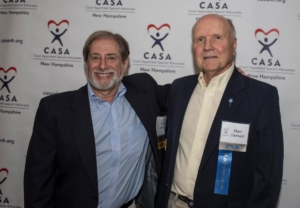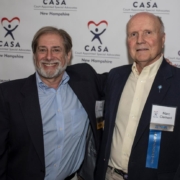CASA Advocates Fred Hurwitz and Marc Clement: 30 Years of Advocacy
Picture this: The year is 1993. Gas is $1.11 a gallon and a postage stamp costs 29¢. It’s the year of low-fat everything, and SnackWell’s cookies are in every grocery cart. Ty, Inc. has released their first series of Beanie Babies, with offerings including Legs the Frog, Squealer the Pig and Chocolate the Moose. And it’s a golden year at the cinema, with the debut of the “Jurassic Park” franchise, the perennial rom-com favorite “Sleepless in Seattle,” and children’s hits “Aladdin,” “Mrs. Doubtfire” and “Free Willy.” Plus, a movie ticket costs less than $5.
their first series of Beanie Babies, with offerings including Legs the Frog, Squealer the Pig and Chocolate the Moose. And it’s a golden year at the cinema, with the debut of the “Jurassic Park” franchise, the perennial rom-com favorite “Sleepless in Seattle,” and children’s hits “Aladdin,” “Mrs. Doubtfire” and “Free Willy.” Plus, a movie ticket costs less than $5.
At Court Appointed Special Advocates (CASA) of New Hampshire, another distinguishing event of 1993 is unfolding. A pre-service training class has graduated not one but two advocates who, an astonishing 30 years later, will still be providing their strong and steadfast voices for the children who need them the most.
Fred Hurwitz
Fred Hurwitz, a computer engineer, was drawn to CASA of NH after working on a computer systems project to aid child support enforcement in the state of Michigan. Through this work he learned that in Detroit alone there were 20,000 fathers who were themselves youths receiving child support and having to pay child support to children of their own. He says, “I just fell over hearing that. I thought, ‘but for the luck of the draw,’ and I knew I had to give back. I wanted to be able to contribute in a professional way, and CASA fit the bill for what I was interested in and what I’d be capable of contributing.”
Thirty years on, in addition to continuing work as a volunteer advocate, Fred shares his decades of knowledge and experience with other CASAs in his role as a peer coordinator. The following are a few of the valuable insights he has gained.
“Early on,” says Fred, “I learned that frequently there’s more than one serious problem in the family, often mental illness and drug abuse. That was something I didn’t understand before; just how connected serious issues are and how difficult that was for the person to deal with.”
“A second thing I’ve come to understand is the demands we’re putting on parents – it’s a lot. Case parents have one year to correct [the circumstances that brought the case about], and it’s not a lot of time for people who are to one degree or another experiencing dysfunction.” But as Fred shares with others, “I don’t think I’ve ever not had empathy for the parent, even in the worst case. We’re not looking for perfection at the end of the year. We’re looking for someone who has made a commitment and is making progress.”
Bernadette Melton-Plante, a CASA program director who has worked with Fred for many years, explains why he is so successful at working with both parents and children, saying, “Fred’s attention to detail is remarkable. He leaves no stone unturned in his case work. Fred has a nice knack of asking hard questions in a very non-threatening way. Parents and children alike feel safe with Fred, his soft-spoken voice is calming and reassuring to all.”
Another lesson Fred has learned is the power early intervention has on psychological and emotional healing. “On one case, the youngest of a group of siblings was frequently exhibiting inappropriate sexualized behaviors due to the abuse they had endured. We got the child placed with a very experienced therapeutic foster family. They had gone through lots of training, and they understood how to execute the therapeutic plan. The child, over the course of their time there, slowly continued to improve. Eventually the child was ready to be adopted. At that point we had gotten it down to where there were just minor behavior issues, but the day they moved permanently into their adoptive home those behaviors stopped as well. That day. It was very powerful.”
Fred says, “I ran into the family a few years later. I didn’t notice the child, but they noticed me. They came running up to me, grabbed me around the legs, and told me how happy they were to see me. I was surprised, because I hardly expected the child to remember me. I said that, and the child said to me ‘You were the one who told me I would get a family, and I did.’ It was a very satisfying outcome.”
It is because of this insight that Fred is pushing for more therapeutic services for a child he is currently serving – and due to the respect both Fred and the CASA program have earned over the years, the judge on the case is listening. Normally case review hearings take place every 90 days, but due to Fred’s concern the judge has called for an additional hearing. “I said I’m afraid that we’re going in too light on services, and we’re going to come back for the six-month review and there’s not going to be any progress. And the judge said ‘I agree with you.’ So, in that particular case we’re having a 45-day hearing so we can meet halfway between the review hearings to make sure things are on track.”
This is certainly not the only time Fred’s experience has positively served his case children. He tells about a case that came about during the course of an eviction. “DCYF was called due to the status of the house, and the children were removed over a holiday weekend. The children were afraid when I met with them. I was able to advocate for their return. The issues weren’t that severe, and they could safely be at home while we resolved the problems.” Fred’s competent assessment of the situation helped the scared children to be more quickly reunified with their parents.
Not only is Fred amongst the longest-serving CASA volunteers, he is perhaps the CASA who has served the longest time on a single case. It was also his very first case, and one that would stretch over 18 years. As with all of his cases, Fred gained valuable takeaways.
As Fred explains, “This was before there was such a strong effort as there is now to make sure the cases close in a reasonable amount of time. The children never got adopted, so they just stayed in the system. That stands out in my mind for a number of reasons. Every time I don’t like an outcome (this is the engineer in me), I look back and think what went wrong, and what can I do differently next time.”
He continues, “One of the things I learned was to trust my instincts. I had instincts about certain things, and I pushed them, but now I would push them even harder. The big thing on that case was that the pre-adoptive parents asked the children if they wanted to be adopted, and the children said no. At that point I felt I really understood the children, and my view was that what they were really saying is ‘you’re asking me to turn my back on my mother.’ What we were never able to successfully get across to that family is ‘don’t ask the question’ – start the adoption process, and if the children really don’t want to be adopted, they’ll make it clear. But I think they want to be adopted, and they don’t feel like a full part of your family — they’re tenuous. They could be ousted at any time, because it’s happened to them before. They need to be adopted for that sense of security.”
Fred says, “The idea of permanency was reinforced for me. The outcomes for those kids was not terribly good. They always felt they could be kicked out at any time. I know they felt that way, because they told me. There have since been systemic changes that make it so that case wouldn’t have occurred that way; now we would move the children [to a different adoptive home]. When I talk to newer CASAs or when I’m mentoring someone, I say this is one of the things I’ve learned – how important it is for the kids to know that it’s permanent. That they belong there.”
Fred takes this and all of the lessons he’s learned as a CASA to heart, and generously shares his insights and experience. Whether it’s through his casework, helping to mentor fledgling volunteers or recruit new ones, or in giving financial support, he is an ever-constant boon to CASA’s mission of bettering the lives of children. His current program manager at CASA, Dellie Champagne, sings Fred’s praises, saying, “Fred Hurwitz has never slowed down. He approaches every case with strong determination as he only wants what is best for the children he serves. He has maintained this commitment for 30 years! He is the Energizer Bunny! I love working with Fred, as he pays attention to every detail and his reports are so thorough.” This is high praise indeed, as written court reports are one of the key ways CASAs provide the vital information they gather to the judge.
Fred’s life outside of CASA is full of a variety of interests. He and his wife Sue raised three children and now help provide daycare and afterschool care – along with a cheering section at soccer games – to their seven grandchildren, who range in age from 16 to a one-year-old. For close to 20 years they’ve also trained seeing-eye dogs. Fred says, “We both love dogs, and we were both deprived of dogs as children, so that’s something we enjoy. We train them from eight weeks of age until they’re 18 months old. We’ve always had a dog. The joke is that when we were dating I gave my wife a dog as a gift, and then we had to get married because of the dog.” Having experienced the thought, care and attention to detail that Fred puts into all aspects of his casework, we at CASA have to assume that this was all part of his plan.
Marc Clement
Marc Clement first learned of Court Appointed Special Advocates of New Hampshire by way of a notice in his church’s bulletin. As a child psychologist and professor at Colby-Sawyer College, where he taught for 35 years, Marc felt called to this volunteer opportunity as one that would befit him both personally and professionally.
Marc says, “I teach courses on child abuse, neglect, domestic violence and then the usual psychology courses. CASA work fits in nicely with what I teach, and it helps me be aware of the types of organizations and agencies that provide services for children. Representing the best interest of children in the courtroom is enlightening for my courses — it keeps me up-to-date on what was going on in the legal aspect of child abuse and neglect.”
Personally, Marc says, “It also satisfies a need that I have to give back to people who have had a bad break in life and who don’t have the resources that I may have. I think I can help people, I can help children. I sort of live by the motto of to whom much is given, much will be expected. I had a very enjoyable childhood, I had a good family, and I felt that I was very fortunate as a child. Clearly a lot of children don’t have that. So, anything that I can do in the CASA realm, I appreciate the opportunity to do it.”
In his time as a CASA Marc has supported dozens of children. While every case has its own special moments, a case that ended somewhat recently stands out to Marc, as he served the child on it for many years. Marc says, “This case was very gratifying, because it ended in an adoption for a teenage boy. Teenagers are hard to place sometimes.”
Marc explains that the child was abandoned by both parents, briefly reunited with the mother, but ultimately abandoned again. The boy was then moved through a variety of foster homes and group homes. During this time Marc was a consistent presence in this child’s life. He regularly visited the boy and learned about the circumstances of the case, kept the judge informed of vital information, and made recommendations on what was in the boy’s best interests.
But time doesn’t stop for children during these cases. And so along with his professional work on the case, Marc was also there personally for the child as he grew into a youth, from providing advice on buying flowers for a date to the school dance, to being the voice on the other end of the first personal phone call the boy had ever received.
Ultimately the happy moment came when the youth was matched with the right family for him. Marc says, “They enjoy a lot of the same things that this boy enjoys, and he has a lot of opportunities. They all enjoy sports, and they have the resources to put him in a school that is a good fit for him. He lived with them for a year and maybe a couple months, and then they adopted him. It was fantastic, for me and for the social worker who worked on that case for probably six or seven years.”
Marc’s CASA program manager, Mark Rissala, worked alongside him during the completion of this case. He says, “Marc is compassionate and advocated in a supportive and effective manner for this boy. He knows and understands this youth well, which he clearly expressed to the court. Marc never wavered in his support and stayed with this boy until he was adopted into his forever home.”
Through the years Marc has shown he can be counted on to help wherever the need is. This includes working on particularly tough cases involving sexual abuse, where his background makes him especially valuable. But, as with many CASAs, there is an age group that he is especially fond of working with. He says, “The cases that I particularly like are the ones with infants and toddlers. It’s my area of expertise. My training and doctoral work was with younger children, so that’s what I like and I think I do a very good job with that.”
He continues, “I like to have those kids because they’re in a critical period of development, and I think if you can intervene at that age and modify or repair the damages that have occurred, I think those children have a better chance in life. And sometimes it’s easier working with those parents. A lot of times with parents of infants and toddlers, they simply don’t know what to do. You know, we don’t have any training for parents. If you have a child you have a child, there’s no license or requirements. I think some young people have children because they’ve had a rough life, they haven’t been successful in lots of different things, and they think the one thing they can be successful with is to have a child. They think nobody loved me and now my child is going to love me. But of course, it doesn’t work that way. I haven’t met many parents who really want to hurt or neglect their children. They just don’t know what to do. So, if they can get into training programs where people help them that can have a significant impact on their children.”
In reflecting on his long service as a CASA, there are a couple of things that Marc has found particularly rewarding. “One is personal,” he says. “It satisfies a need and a desire I have to give back. Also, no matter how the case goes, I always get the sense that what I’m doing is improving the life of this child. Permanency is the goal. Sometimes it takes a lot longer than you hope it would take, but as long as the child is safe, as long as the child is progressing in a happy environment, I feel like I’m doing what I need to do.”
Marc’s work supporting the wellbeing of children extends far beyond his role as a CASA volunteer. For 26 years he has chaired and co-chaired the New Hampshire Child Fatality Review Committee through the DOJ and now DHHS. “It’s a pretty high-powered committee,” he says. “It includes the chief medical examiner, people from DHHS, law enforcement, other medical personal, and the head of DCYF. We review the deaths of children who died from unnatural or preventable causes, then work on recommendations to try to reduce the probability of these deaths occurring in the future.”
In July Marc was recognized for his monumental contribution on the committee when he was awarded the Theresa Covington Award for Excellence in Child Fatality Review at the annual Safe Kids Worldwide Childhood Injury Prevention Convention (PrevCon).
Marc spends his personal time with family, friends and in the garden. A grandfather of five, he is often taking part in family activities. He and his wife Patricia also travel, he says, “usually in conjunction with visiting friends and family.” And while at home, you’ll find Marc in his large vegetable garden, “fussing around” developing new flower beds with his wife, or in his lupine nursery. Whether it’s friendships, vegetables and flowers or children, Marc is a constant nurturer, helping all he encounters to grow and thrive.
If you would like to become a CASA volunteer advocate and help children, consider attending an upcoming virtual information session to learn more, or submit an application today.



